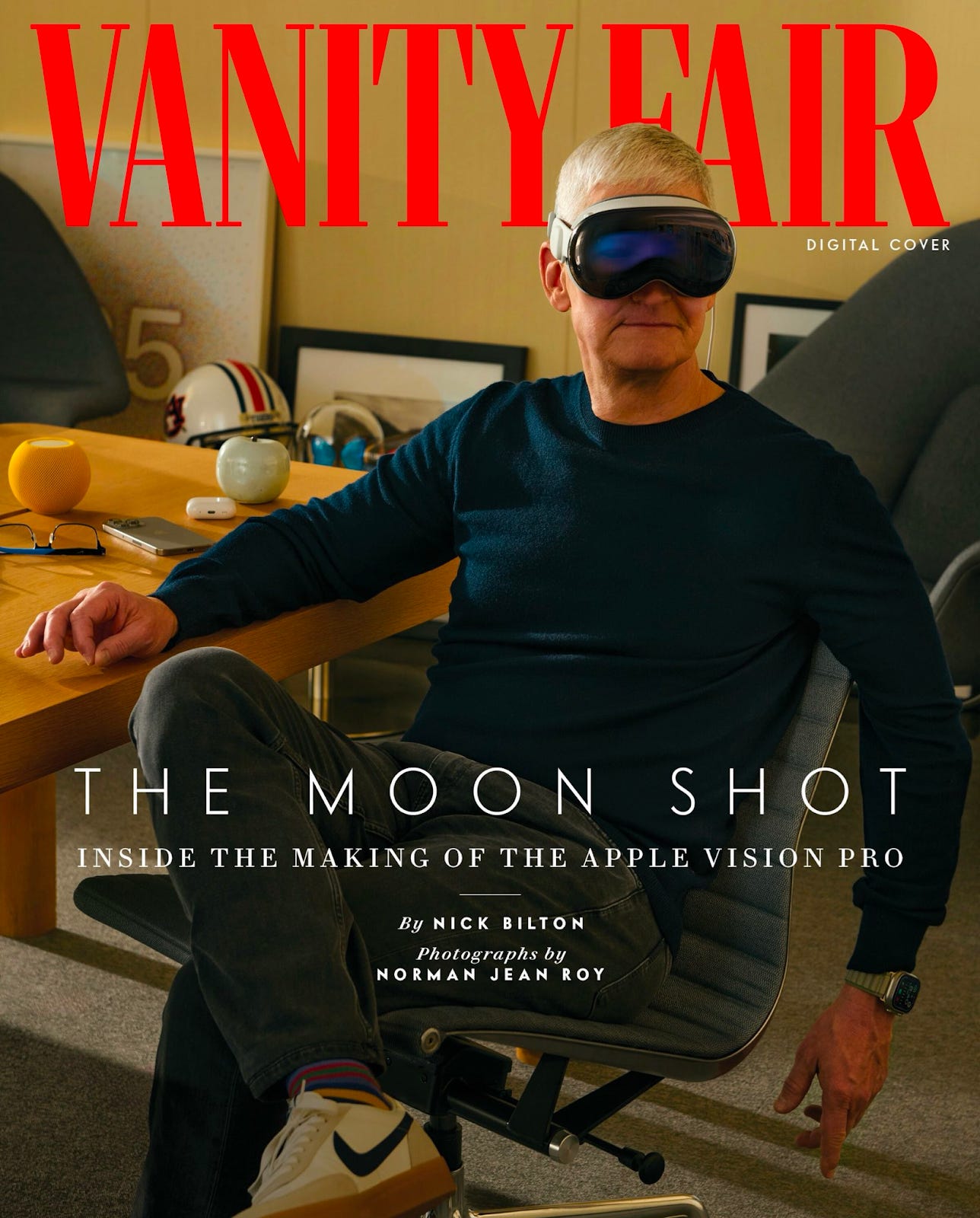Does Anyone Care That Your Vision Pro is Watching You?
As more and more consumers use hot new wearable products, tech companies now have unprecedented access and novel data to use to train their products
Fresh after tech week we had an Apple launch for the new “must have” tech item - the Apple Vision Pro. As more and more consumers use hot new wearable products, tech companies now have unprecedented access and novel data to use to train their products. Maybe, we should be a bit more concerned.
New Wearables Expand the Frontier of Exploitable Data
The launch of the new Apple Vision Pro was a semi-religious experience for tech fans. The first customer was showered in applause. Social media was ablaze with demos. Meanwhile, the Big Data Beast was licking its lips at all the new forms of personal data people will be freely sharing with tech companies.
Caption: The first sale, met with staged applause
Apple’s entry into the VR space marks a turning point where the tech is going mainstream. AR/VR hardware is going from nerd-chic to Vanity Fair stylish. Just as we saw from smartphones to earpods to smart watches, Apple’s products make new gadgets cool.
Caption: CEO, Technologist, and (now) Goggle Model
The scary issue is that the launch of every new tech vertical represents a new category of data that is now recordable for companies to analyze and infringe on personal privacy. Smart speakers led to everyone giving their voice recording, including their children’s voices, to companies to train their voice models. Smart watches and fitness wearables let people hand over their heart rates and running routes (including the perimeters of US bases) in exchange for their fitness data. Celebrities attended parties to spit in a tube to give away their DNA to a company that can now be bought by anyone who wants the data for pennies on the dollar.
Now, people are happily strapping high-resolution cameras onto their faces and preparing to share a whole new suite of intimate data. Only this time it opens up a concerning new frontier of personal information for companies to harvest.
Products So Good You Can’t Look Away
Caption: The ultimate engagement device
Digital advertising created a new frontier of data to understand human behavior. For the first time, ads were judged by clicks and conversion rates instead of the reactions of Mad Men and global sales. New data leads to new attribution, and the data collected by emerging wearable products should leave us all concerned.
Products like the Apple Vision Pro or Meta Quest don’t just let you watch new content. They watch you. In addition to watching your surrounding environment, the products closely track your eye movements and pupil dilation, creating unprecedented intimacy with users. A former Neurotechnology Prototyping Researcher that spent three years on the Vision Pro likened the product’s predictive abilities to “mind reading” in the way the product uses pupil movement to predict clicks, or by measuring reaction to stimuli to assess a user’s mood and focus.
That same researcher also revealed Apple is researching how to use data from heart beats, muscle activity, electrical activity, blood pressure, and skin conductance to predict user’s thoughts.
If you think social media or Netflix is addictive now, wait until these products are optimized with AI models trained on in-depth measurement of your body’s reaction to every stimuli. It won’t just use your conscious actions like where you click or how long you watch. Every eye-twitch and subconscious reaction will be used to make software products perfectly tuned to maximize your engagement.
Of course, the industry will say product optimization is all about making services people want to use, but if we learnt anything from the invention of the “like” button, we’re already crossed from optimization to manipulation. Technology and advertising companies want to make their products as sticky as possible. Intimate biometric data collected through wearables will allow them to supercharge those efforts.
Will People Even Care?
Perhaps the scariest part of all is that people simply might not care. If there’s one thing we’ve seen, people are happy to give away their data for a shiny new tech feature. People consistently hand over their information to avoid additional friction in their lives.
A call center asks to record your call? Fine, so long as we get off the phone faster. Clear wants my fingerprint and to scan my retina? Who cares, if it means we can skip the airport security line. Zoom says they’ll train AI models on call and video data? Whatever, so long as it works when my next meeting starts.
To our detriment, we live in an age that values convenience over privacy. The concern is about more than privacy for its own sake. What we also need to fear is the way that our technology shapes us. Technology that is more addictive, more potent, and understands our mood better than we do is poised to shape our behaviors and distort our relationships.
This Valentine’s day, look to see how many couples are both on their phones. What happens when those notifications are fine-tuned on the retina reactions of billions of eyeballs? What other social interactions and norms will shift as we grow more comfortable with high-powered cameras on our faces?
As people applaud the launch of the Vision Pro, just as they applauded the launch of the iPhone over 15 years ago, it is worth considering the second-order effects of a society defined by technology able to assess our every blink and facial twitch.
Regardless of whether we fear or embrace this new technology, it is here to stay. That’s why now, more than ever, it’s so important we fight for technology that is ethical and promotes human flourishing rather than making us slave to our most basic desires.
Tell us your thoughts! What are your thoughts on the Vision Pro and other wearables? Are you concerned about the privacy implications?
What We’re Reading On Ethical (and Non-Ethical) Tech This Week:
Over Three Decades, Tech Obliterated Media My front-row seat to a slow-moving catastrophe - The Information
Biden Aims to Stop Countries From Exploiting Americans’ Data for Blackmail, Espionage - Bloomberg
Marketers are already reading your mind. You just haven’t noticed yet - Marketing Mag
Venmo privacy settings to change now - Washington Post
Great Internet Cookie Crumble Will Leave Risky Morsels - Bloomberg









